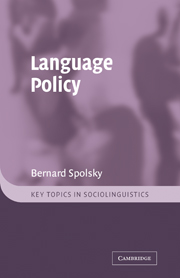Book contents
- Frontmatter
- Contents
- List of tables
- Preface
- 1 Language practices, ideology and beliefs, and management and planning
- 2 Driving out the bad
- 3 Pursuing the good and dealing with the new
- 4 The nature of language policy and its domains
- 5 Two monolingual polities – Iceland and France
- 6 How English spread
- 7 Does the US have a language policy or just civil rights?
- 8 Language rights
- 9 Monolingual polities under pressure
- 10 Monolingual polities with recognized linguistic minorities
- 11 Partitioning language space – two, three, many
- 12 Resisting language shift
- 13 Conclusions
- References
- Index
12 - Resisting language shift
Published online by Cambridge University Press: 22 December 2009
- Frontmatter
- Contents
- List of tables
- Preface
- 1 Language practices, ideology and beliefs, and management and planning
- 2 Driving out the bad
- 3 Pursuing the good and dealing with the new
- 4 The nature of language policy and its domains
- 5 Two monolingual polities – Iceland and France
- 6 How English spread
- 7 Does the US have a language policy or just civil rights?
- 8 Language rights
- 9 Monolingual polities under pressure
- 10 Monolingual polities with recognized linguistic minorities
- 11 Partitioning language space – two, three, many
- 12 Resisting language shift
- 13 Conclusions
- References
- Index
Summary
RESISTING LANGUAGE SHIFT
The theory of language policy that has been developed in this book proposes three principal components: language practices, language ideology or beliefs and language management or planning. Language practices develop and are influenced in large measure by the external social context, and include the necessity of choice among available variants on the basis of beliefs that assign values to the variants. Language management, then, becomes an attempt to modify the values or practices of someone else.
A not dissimilar model is suggested in the work of Pierre Bourdieu, with his notions of the linguistic habitus (Bourdieu 1981) and the linguistic marketplace (Bourdieu 1991); see also Gogolin (2001a; 2001b). The habitus is a “set of dispositions, which incline the manner of action and reaction of the individual.” It generates both practices and attitudes, and is derived from the social background of the individual, leading to similarities in people from the same social class. Individuals function in a field or market, struggling generally to preserve or improve their positions. An individual's linguistic habitus governs language behavior as well as judgments about the value of languages and styles.
In ch. 7, we saw how changes in the demographic and economic systems could lead to changes in the values assigned to language varieties. As an individual moves from one level or field or market to another, or as globalization opens up and expands the scope of the relevant linguistic system, so one language rather than another becomes valuable.
- Type
- Chapter
- Information
- Language Policy , pp. 186 - 216Publisher: Cambridge University PressPrint publication year: 2003



